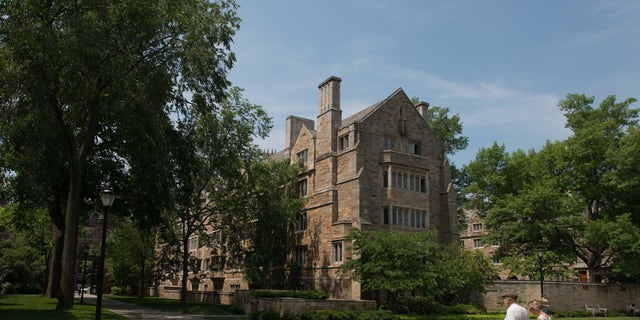NEWYou can now listen to Fox News articles!
Recent reporting and polling has indicated that the gender-neutral term “Latinx” isn’t that popular among Hispanics and its use may be limited to elite institutions.
“The reality is, there is very little to no support for its use, and it’s sort of seen as something used inside the Beltway or in Ivy League tower settings,” League of United Latin American Citizens President Domingo García reportedly said.

Pedestrians walk down a path on the Yale University campus in New Haven, Connecticut. (Craig Warga/Bloomberg via Getty Images)
The Miami Herald similarly argued the term “failed to gain buy-in from the people it’s supposed to empower,” raising questions about why it has become so prevalent in the media, politics and elite institutions.
Elite universities, among others, have been employing the word to describe a wide range of activities – including courses of study, events and campus groups.
HISPANIC FIGURES REPORTEDLY PUSH BACK ON USE OF ‘LATINX’: APPEASES ‘WHITE RICH PROGRESSIVES’
For example, Harvard University offers a “Latinx Studies” degree as part of its Department of Romance Languages & Literatures. Included among the required courses is “Latinx Theory: Being and Knowing.” A Spring 2022 seminar is similarly titled “Law and the Legal System through the Lens of Latinx/a/o Communities.”

The campus of Harvard University in Cambridge of Massachusetts. (Fan Lin/Xinhua via Getty)
Yale University, meanwhile, offers a “Latinx studies” collection for its library while also hosting a “Latino Cultural Center” at its undergraduate college. Dartmouth College appears to describe its Hispanic population generally as Latinx.
Its “Latinx Student Advising” reads: “There are multiple terms, often used interchangeably, to describe diverse Latinx student communities on college campuses. These include- but are not limited to- Latina/o, Latin American, Caribbean, Hispanic, Chicana/o. The term Latinx has emerged as a pan-ethnic sociopolitical category intended to include any and all who may self-identify as having cultural ties to Latin America and/or the Caribbean as well as individuals who are of Latin American and/or Caribbean descent. Latinx is a gender inclusive term where the -x replaces a traditional -a/-o ending and can be pronounced as ‘lah-teen-ex’.”
Not everyone is opposed to the term and activists have indicated it’s intended to enhance inclusion rather than ban certain words. It’s also difficult to say how Ivy League institutions decided to use that term the way they have.
ARIZONA DEMOCRAT GALLEGO SLAMS USE OF ‘LATINX’ AS A PERFORMATIVE TERM TO APPEASE ‘WHITE RICH PROGRESSIVES’
The University of California, Berkeley houses a “Latinx Research Center,” which asserts that “Latinxs are California’s largest and most rapidly growing minority population whose presence dates to the formation of the United States.”

Students walk near the Sather Gate on the UC Berkeley campus in Berkeley, Calif., on Tuesday, Aug. 24, 2021. (Jane Tyska/Digital First Media/East Bay Times via Getty Images)
But polling indicates that “Latinx” doesn’t get much traction among the general population. Data from Pew Research Center showed that only 3% of individuals who identify as Hispanic or Latino use “Latinx” to describe themselves.
“Latinx” tends to pop up in various university events. At Brown University, for example, there is a “Latinx Heritage Series” that resulted from “the merging of LatinxHistory Month, Semana Chicana, and Puerto Rican Identity Week.”
CLICK HERE TO GET THE FOX NEWS APP
Columbia University’s engineering college features a “Latinx Heritage Month” student group, as well as a “Latinx and Latin American Faculty Working Group.” The University of Chicago also has a “Latinx Law Students Association” featured on its website, in addition to noting a “Latinx Heritage Month Committee.”
While Cornell University offers a “Latino Studies Program,” it has also advertised a “Latinx Town Hall” to gauge interest in the major. At Stanford, the university similarly seems to use Latinx interchangeably with other terms. In describing its “Latinx Ethnic-Theme House,” its website says the theme “creates a common bond for all residents—Latino and non-Latino alike—that fosters cross-cultural understanding and creates outstanding learning opportunities.”